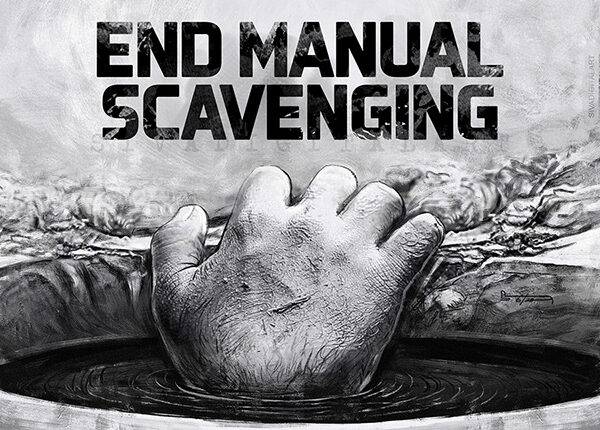Published on: March 12, 2022

MANUAL SCAVENGING
MANUAL SCAVENGING

CONTEXT
- Three labourers in Mumbai, allegedly hired for manual scavenging, died after inhaling toxic fumes in a septic tank
- Even though manual scavenging is banned in India, the practice is still prevalent in many parts of the country
MANUAL SCAVENGING
- Manual scavenging is practice of removing human excreta by hand from sewers or septic tanks
- In 2013, the definition of manual scavengers was also broadened to include people employed to clean septic tanks, ditches, or railway tracks
- Government recognizes manual scavenging as a “dehumanizing practice,” and cites a need to “correct the historical injustice and indignity suffered by the manual scavengers.”
WHY IS MANUAL SCAVENGING STILL PREVALENT IN INDIA?
- India banned the practice under the Prohibition of Employment as Manual Scavengers and their Rehabilitation Act, 2013 (PEMSR). The Act bans the use of any individual for manually cleaning, carrying, disposing of or otherwise handling in any manner, human excreta till its disposal.
- The lack of enforcement of the Act and exploitation of unskilled labourers are the reasons why the practice is still prevalent in India. The Mumbai civic body charges anywhere between Rs 20,000 and Rs 30,000 to clean septic tanks. The unskilled labourers, meanwhile, are much cheaper to hire and contractors illegally employ them at a daily wage of Rs 300-500.
- Several independent surveys have noted that government’s continued reluctance to admit that the practice prevails under their watch.
- Sewer cleaning tasks are frequently outsourced to private contractors. Many of them, though, are fly-by-night operators who do not keep proper records of sanitation workers. These contractors have denied any involvement with the deceased in case after case of workers being asphyxiated to death. The practice is driven by caste, class, and income divides.
- The Employment of Manual Scavengers and Construction of Dry Latrines (Prohibition) Act, 1993, made it illegal to employ individuals as manual scavengers in India, but the stigma and discrimination connected with it persist. This makes it difficult for the liberated manual scavengers to find alternate sources of livelihood.
STEPS TAKEN BY GOVERNMENT
- The Prohibition of Employment Scavenger and their Rehabilitation Act,2013: The act aims to strengthen the prohibition of manual scavenging in all forms and to ensure that manual scavengers are rehabilitated.
- Prevention of Atrocities Act: It delineates specific crimes against the Scheduled Castes and the Scheduled Tribes.
- National Commission of Safai Karamcharis: The Commission is a non-statutory body of the Ministry of Social Justice and Empowerment.
- Mission Swachh Bharat: Swachh Bharat Abhiyan (Swachh Bharat Abhiyan) is a nationwide initiative initiated by the government on October 2, 2014, to clean the country’s streets, roads, and social infrastructure.
- The Prohibition of Employment as Manual Scavengers and their Rehabilitation (Amendment) Bill, 2020: It proposes that sewer cleaning be completely mechanized, that methods for ‘on-site’ protection be implemented, and that manual scavengers be compensated in the case of sewer deaths.The Prohibition of Employment as Manual Scavengers and their Rehabilitation Act, 2013, will be amended.
- Safaimitra Suraksha Challenge: The Ministry of Housing and Urban Affairs launched it on World Toilet Day (19 November) in 2020.The government issued a “challenge” to all states to mechanize sewer cleaning by April 2021; if a human needs toenter a sewer line in an unavoidable emergency, proper gear and oxygen tanks etcto be provided.
- Swachhta Abhiyan App: It was developed to locate and geotag data on insanitary latrines and manual scavengers so that unsanitary latrines can be replaced with sanitary latrines and all manual scavengers can be rehabilitated so that they can live with dignity.
- SC Decision: A Supreme Court judgment in 2014 mandated that the government identify all people who died in sewage work since 1993 and compensate their families with Rs. 10 lakh each.
WAY FORWARD
- Identification: States must precisely estimate the workers involved in the cleanup of toxic sludge.
- Empowering Local Administration: The 15th Finance Commission has recognized the Swachh Bharat Mission as a top priority area, and funds are available for smart cities and urban development, making a strong case for addressing the problem of manual scavenging.
- To eliminate the social stigma associated with manual scavenging, it is necessary to first acknowledge and then understand how and why manual scavenging remains embedded in the caste system.
- The Need for Stringent Laws: If a law establishes a statutory responsibility on the part of state agencies to provide sanitary services, the rights of these workers will no longer be in jeopardy.

